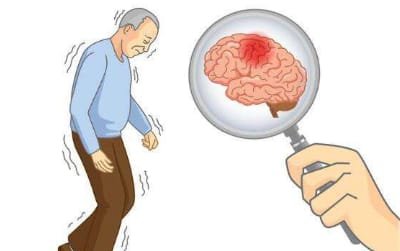Introduction
The most terrifying thing about cerebral infarction is the sequelae. Whether in the community or in the park, you can always see people in wheelchairs and on crutches. These people are not old and unable to walk. Most of these people are hemiplegia and hemiplegia caused by the sequelae of cerebral infarction.
understand cerebral infarction. Exercise precautions for stroke male and female
Cerebral infarction refers to ischemic stroke, and is our most common type of stroke. It includes cerebral thrombosis and cerebral embolism.

- The formation of cerebral thrombosis is because the blood vessel narrows and the blood flow slows down, and then a blood clot forms in the brain.
- Cerebral embolism is different. It is a cerebral infarction caused by the small blood vessels that flow to the brain with the blood after the emboli from other parts of the body fall off. Common emboli are intracardiac and lower extremity veins.
What is the most feared exercise for cerebral infarction?
Because most patients after cerebral infarction have mild or severe sequelae, such as hemiplegia, slurred speech, limp, etc., which requires patients to perform rehabilitation exercises for a long time in the future to help restore the normal function of the limbs. Moreover, continuous exercise after rehabilitation is also an important intervention for preventing the recurrence of cerebral infarction.
It can be said that exercise intervention runs through the treatment and rehabilitation process of patients with cerebral infarction. As long as the patient’s physical condition allows, moderate exercise should adhere to every day. However, the movement here is definitely not random and requires caution.

- Patients with cerebral infarction are most afraid of exercise that exceeds their own capacity, including high-intensity exercise, excessive exercise, strenuous exercise, etc.
- The exercise of patients with cerebral infarction must be gradual and gradual.
- Start with a small amount of exercise, and initially choose low-intensity exercise, and cannot exercise for a long time, such as starting from walking, housework, etc., each time lasting 30-60min, the purpose is to help restore the normal limbs features.
- Do not engage in high-intensity and long-term exercise in pursuit of so-called exercise volumes, such as fast running, strength training, and heavy physical activities.
What are the things to keep in mind while exercising?
- Exercise intensity
- Exercise time
- Insist on exercising
- Infraction

1. Exercise intensity:
The elderly, especially those with chronic diseases such as high blood pressure, diabetes, and hyperlipidemia, should pay attention to the exercise intensity should not be too large, just maintain a moderate intensity, because strenuous exercise, blood will be distributed in the muscles of the limbs If it increases, the blood supply to the brain is reduced, which is more likely to induce cerebral infarction. When exercising, you feel a little hard, breathing and heart rate are accelerated, but not rapid, and you can speak, that is, reaching the standard of moderate intensity.

2. Exercise time:
The elderly should not exercise too early, especially in cold weather. The temperature in the morning is low, which can cause increased heart rate, vasoconstriction, and increased blood pressure, increasing the risk of cerebral infarction. It is best to exercise indoors in cold seasons. Be sure to keep warm.
3. Insist on exercising:
If regular exercise is stopped for more than 3 days, the accumulated effect will be greatly reduced or even disappear. To prevent cerebral infarction, you should persist in exercising, cultivate an active lifestyle, increase daily physical activity, reduce sedentary time, and prevent
4. Infarction.
Incorporate beneficial exercise into your daily life.Exercise is a good habit, but for people at high risk of cerebral infarction, in the acute phase of cerebral infarction, or in the recovery period, the benefits of exercise are more emphasis on reasonable, gradual, and moderate aerobic exercise, rather than strenuous, high-intensity, and overload. exercise to avoid joint damage. Come winter, try to choose indoor sports.
Read more update and tips about health on http://www.facefof.com
